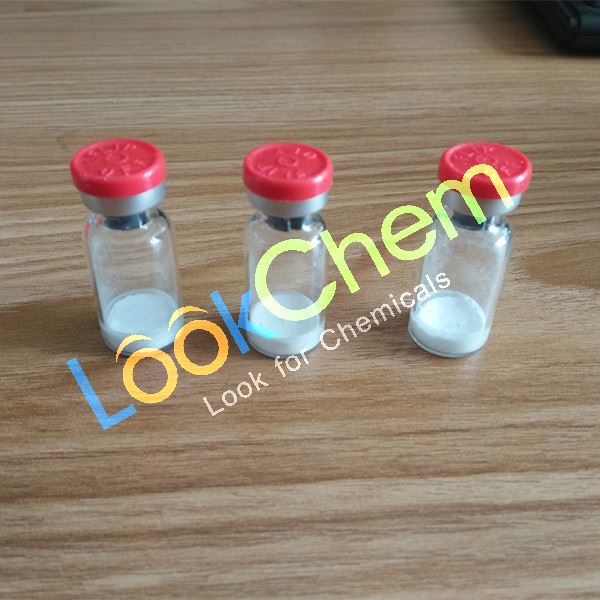Healthy Peptide Human Chorionic Gonadotropin HCG for Pregnancy Test CAS NO.56832-34-9
- FOB Price: USD: 3.00-5.00 /Gram Get Latest Price
- Min.Order: 10 Gram
- Payment Terms: T/T,
- Available Specifications:
pharmaceutical grade(1-10)Grampharmaceutical grade(10-20)Gram
- Product Details
Keywords
- HCG
- polypeptide
- peptides
Quick Details
- ProName: Healthy Peptide Human Chorionic Gonado...
- CasNo: 56832-34-9
- Molecular Formula: C105H169N27O32
- Appearance: White powder
- Application: Bodybuilding,Chemical,Research etc.
- DeliveryTime: within 3days
- PackAge: Fresco Bag,Vials
- Port: shanghai
- ProductionCapacity: 10000 Gram/Week
- Purity: 98%
- Storage: Store the shade
- Transportation: By Air,TNT,EMS,DHL,HKEUB
- LimitNum: 10 Gram
- Categories: vials
Superiority
Zhengzhou Filter Business

Skype:ruoyu92
Whatsapp:+8618003706993
Email:filter-sales12@filterbio-technology.com

<
|
Peptides Hotsale Products List |
||
|
Pruduct Name |
Specification |
Purity |
|
HGH191AA |
10IU/vial |
0.98 |
|
HGH(176-191) |
2mg/vial |
0.98 |
|
GHRP-2 |
5mg/vial |
0.98 |
|
GHRP-6 |
5mg/vial |
0.99 |
|
CJC1295withdac |
2mg/vial |
0.988 |
|
CJC1295withoutdac |
2mg/vial |
98% |
|
Adipotide |
2mg/vial |
95% |
|
MT-II |
10mg/vial |
95%-99% |
|
PT-141 |
10mg/vial |
0.98 |
|
TB-500 |
2mg/vial |
0.98 |
|
IGF-1(1-3) |
2mg/vial |
95%-99% |
|
IGF-1 Lr3 |
1mg/0.1mg(vial) |
98% |
|
Tesamorelin |
2mg/vial |
95%-99% |
|
Epithalon |
10mg/vial |
95%-99.5% |
|
Hexarelin |
2mg/vial |
0.98 |
|
Triptorellin |
2mg/vial |
0.98 |
|
Ipamorelin |
2mg/vial |
0.98 |
|
Terlipressin Acetate |
10mg/vial |
0.98 |
|
Melanotan-I |
10mg/vial |
0.98 |
|
MGF |
2mg/vial |
0.98 |
|
PEG-MGF |
2mg/vial |
0.98 |
|
Sermorelin |
2mg/vial |
0.98 |
|
Desmopressin Acetate |
2mg/vial |
0.98 |
|
BCP-157 |
5mg/vial |
98% |
|
Nesiritide Acetate(BNP-32) |
2mg/vial |
98% |
|
Dynorphin A(1-13)Acetate |
5mg/vial |
98% |
|
HCG |
5000IU/vial |
|
|
Selank |
5mg/vial |
0.988 |
Details
Healthy Peptide Human Chorionic Gonadotropin HCG for Pregnancy Test
The human chorionic gonadotropin (hCG) test is done to check for the hormone hCG in blood or urine. Some hCG tests measure the exact amount. Some just check to see if the hormone is present. HCG is made by the placenta during pregnancy. The test can be used to see if a woman is pregnant. Or it can be done as part of a screening test for birth defects.
HCG may also be made by certain tumors, especially those that come from an egg or sperm. (These are called germ cell tumors.) HCG levels are often tested in a woman who may have tissue that is not normal growing in her uterus. The test also may be done to look for molar pregnancy or a cancer inside the uterus. Several hCG tests may be done after a miscarriage to be sure a molar pregnancy is not present. In a man, hCG levels may be measured to help see if he has cancer of the testicles .
HCG to detect pregnancy
An egg is normally fertilized by a sperm cell in a fallopian tube . Within 9 days the fertilized egg moves down the fallopian tube into the uterus. It then attaches (implants) to the wall of the uterus. After the fertilized egg implants, the growing placenta starts releasing hCG into your blood. Some hCG also gets passed in your urine. HCG can be found in the blood before the first missed menstrual period. This can be as early as 6 days after the egg implants.
HCG helps to keep your pregnancy going. It also affects the development of your baby (fetus). Levels of hCG go up fast in the first 14 to 16 weeks after your last menstrual period. They are the highest around the 14th week following your last period. They then go down gradually. The amount that hCG goes up early in pregnancy can give information about your pregnancy and the health of your baby. Soon after delivery, hCG can no longer be found in your blood.
More hCG is released in a multiple pregnancy, such as twins or triplets, than in a single pregnancy. Less hCG is released if the fertilized egg implants in a place other than the uterus, such as in a fallopian tube. This is called an ectopic pregnancy.
The level of hCG in the blood is often used as part of a screening for birth defects in a maternal serum triple or quadruple screening test. These tests are usually done between 15 and 20 weeks of pregnancy to check the levels of three or four substances in a pregnant woman's blood. The triple screen checks hCG, alpha-fetoprotein (AFP), and a type of estrogen (unconjugated estriol, or uE3). The quad screen checks these substances and the level of the hormone inhibin A. The levels of these substances-along with a woman's age and other factors-help the doctor figure out the chance that the baby may have certain problems or birth defects.
Pregnancy: Should I Have Screening Tests for Birth Defects
In some cases, screening tests are combined in the first trimester to look for Down syndrome. This screening test uses an ultrasound to measure the thickness of the skin at the back of the fetus's neck (nuchal translucency). It also includes a blood test for the levels hCG and a protein called pregnancy-associated plasma protein A (PAPP-A). This test works about as well as the second-trimester maternal serum quad screening.

Our Lab

Freight





